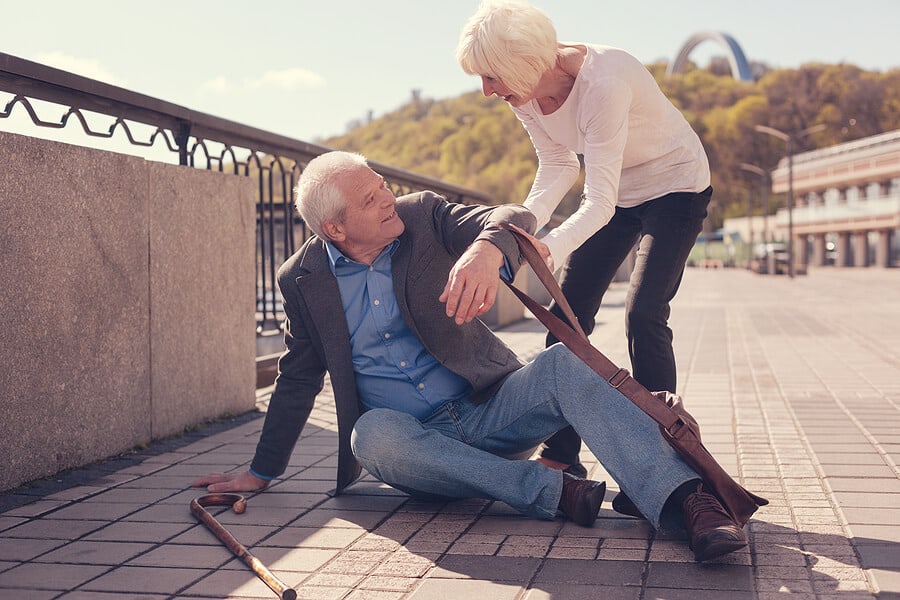- Volunteering for Hearing Health Causes - May 27, 2025
- Questions to Ask During Your Hearing Health Appointment - May 16, 2025
- Exploring Alternative Therapies for Hearing Loss - May 6, 2025
Falls and accidents pose significant risks to individuals of all ages. Older adults with hearing loss have a higher risk of having an accident or fall. This is due to factors such as impaired balance, reduced spatial awareness, and difficulty in detecting environmental hazards. However, with the right hearing aids and proactive measures, individuals with hearing loss can take steps to prevent falls and accidents and maintain their safety and independence.
Understanding the Link Between Hearing Loss and Falls
Hearing loss can impact various aspects of physical and cognitive function, including balance, spatial orientation, and situational awareness. When individuals experience hearing loss, they may struggle to detect auditory cues and environmental sounds such as approaching vehicles, falling objects, or alarms.
Additionally, untreated hearing loss has been associated with changes in brain structure and function, including alterations in the vestibular system, which plays a crucial role in maintaining balance and stability. These factors can increase the risk of falls and accidents, particularly in challenging or unfamiliar environments.
The Role of Hearing Aids in Fall Prevention
Hearing aids play an important role in fall prevention. Hearing devices can improve auditory awareness, enhance communication, and promote situational awareness. By amplifying sounds and speech, hearing aids help individuals with hearing loss detect environmental cues and warnings more effectively. This will allow you to respond promptly to potential hazards. Modern hearing aids are also equipped with advanced features such as directional microphones, noise reduction algorithms, and connectivity options that enhance speech clarity and reduce background noise. This also improves communication and safety in noisy or crowded environments.
Practical Tips for Preventing Falls and Accidents with Hearing Aids
Here’s how you can prevent falls and accidents with your hearing aids:
- Wear Your Hearing Aids Consistently: Consistency is key when it comes to reaping the benefits of hearing aids. Wear your hearing aids consistently throughout the day, even in quiet or familiar environments, to maximize your auditory awareness and reduce the risk of missing important auditory cues or warnings.
- Keep Your Hearing Aids Well-Maintained: Regular maintenance and cleaning are important for optimal performance and reliability. Follow the manufacturer’s recommendations for cleaning and maintenance, and schedule regular check-ups with your hearing health professional to ensure that your hearing aids are functioning properly and adjusted to your specific needs.
- Stay Alert and Attentive: Pay attention to your surroundings and remain alert to potential hazards, particularly in busy or unfamiliar environments. Use your hearing aids to help you stay attuned to auditory cues such as approaching footsteps, vehicle sounds, or warning signals. You can also take proactive measures to avoid risky situations whenever possible.
- Use Assistive Devices and Technologies: In addition to hearing aids, consider using assistive devices and technologies to enhance your safety and communication abilities. Devices such as vibrating alarms, flashing lights, and doorbell signalers can supplement auditory cues and alerts, providing additional support in detecting environmental hazards and emergencies.
- Practice Balance and Mobility Exercises: Incorporate balance and mobility exercises into your daily routine to improve strength, stability, and coordination. Activities such as yoga, tai chi, and gentle stretching can help enhance your balance and reduce the risk of falls by promoting better posture, muscle tone, and proprioception.
- Maintain a Safe Home Environment: Take proactive steps to create a safe and accessible home environment that minimizes the risk of falls and accidents. Remove clutter and tripping hazards, install grab bars and handrails in key areas such as bathrooms and stairwells, and ensure adequate lighting throughout your home to improve visibility and navigation.
- Communicate Your Needs: Don’t hesitate to communicate your hearing loss and safety concerns to family members and friends. Educate them about the importance of clear communication, effective use of hearing aids, and environmental modifications to reduce the risk of falls and accidents. By working together as a team, you can create a supportive and safe environment that promotes your well-being and independence.
Find Your Next Hearing Aids
The right hearing aids can help you prevent falls and accidents. Visit us today to explore your hearing aid options. We work with the world’s top hearing aid brands to bring you the best in hearing solutions.

